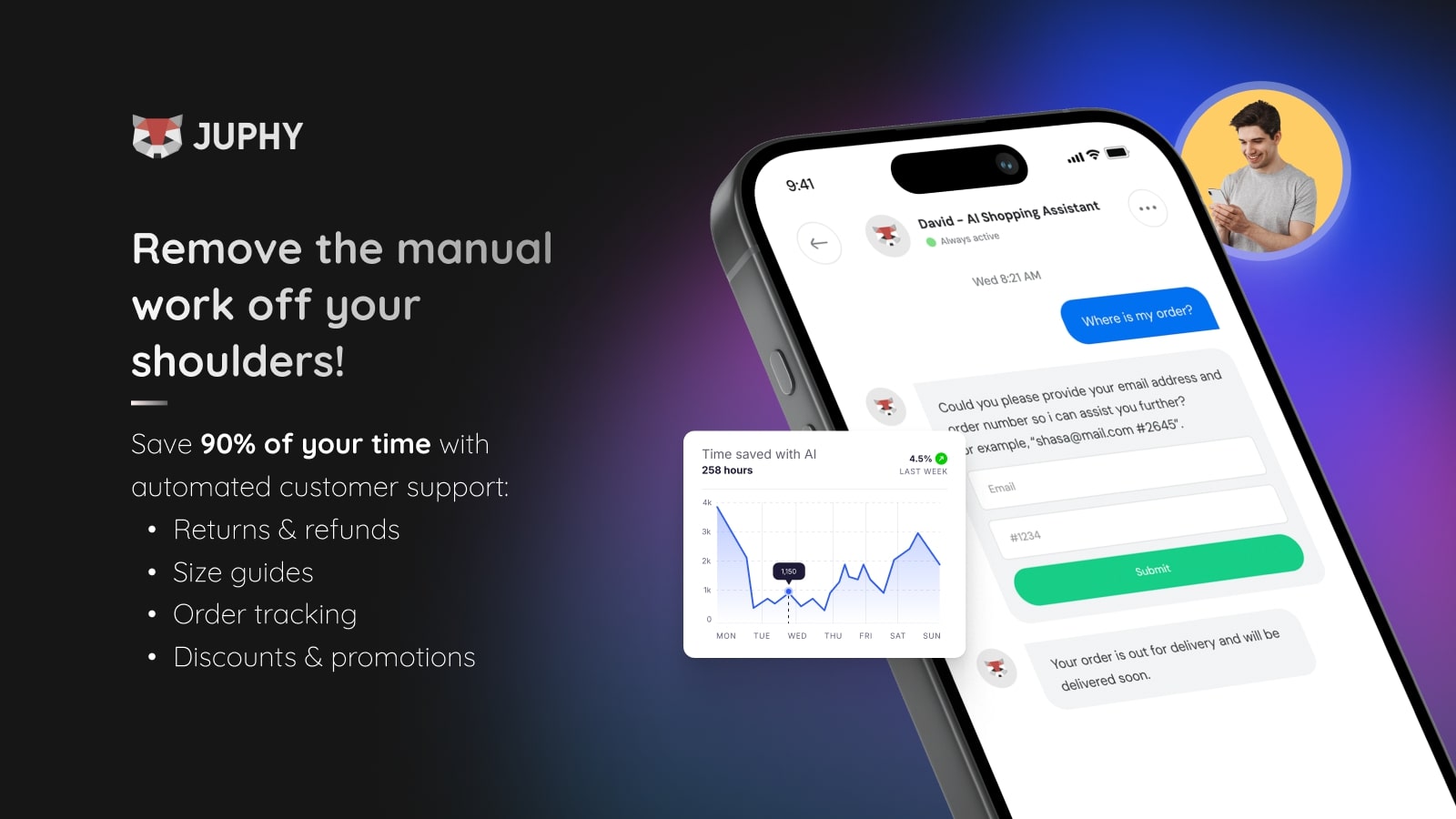Juphy’s Weekly E-Commerce News Express – 02-06 June 2025
Ceyda Duz
What’s happening in the world of e-commerce and AI this week? Plenty, as always! We’re diving into some big shifts you need to know about, from how AI is (and isn’t) reshaping customer service, to a major social commerce platform’s push into new markets. Plus, we’ll look at the latest updates and tech rolling out for online merchants, covering everything from increasing store performance to new payment options. Let’s get right into it.

The AI Paradox: Why Customer Service Isn’t Getting Better (Yet)
A curious trend is unfolding in the customer service landscape. Despite the widespread adoption of Artificial Intelligence, customer satisfaction metrics remain stubbornly low. It’s a paradox: businesses are leveraging incredible technology, yet many customers feel less satisfied than ever.
Before delving into the complexities of AI integration, it’s essential to revisit the timeless tenets of exceptional customer service. Research consistently shows that what truly resonates with customers includes:
- Genuine Empathy: Customers want to feel understood, not merely processed.
- Reliable Reassurance: Confidence that their needs are heard and acted upon.
- Personal Connection: A sense that they are valued as individuals.
- Effective Problem Solving: Clear, swift, and satisfactory resolutions.

Yet, customers seek a human touch and genuine care, even in digital interactions.
The AI Promise vs. Reality Check
AI promised a revolution: faster responses, hyper-personalization, and the freeing up of human agents for more complex issues. However, the latest UK Customer Satisfaction Index (UKCSI) confirms a troubling reality—satisfaction is at a decade low, costing businesses billions in lost loyalty. The initial promise of AI in customer service hasn’t yet fully aligned with customer perception.
This disconnect often stems from a significant trust barrier:

- Frustrating Chatbot Experiences: A common complaint involves getting trapped in automated loops without reaching a resolution.
- Data Concerns: Uncertainty persists regarding how personal information is processed and utilized by AI systems.
- Loss of Control: Customers can feel depersonalized during complex interactions with automated systems.
- The Need for Human Empathy: For intricate or sensitive queries, there’s an innate preference for the nuanced understanding a human can provide.
Where AI Truly Shines: The Unseen Power
The reality is that AI does possess immense potential, but its most profound impact frequently occurs outside of direct customer view. Consider its crucial role in optimizing the customer journey behind the scenes:
- Predictive Analytics: AI can identify potential issues before they even impact customers.
- Agent Augmentation: It provides human agents with real-time, data-driven insights during live interactions, enhancing their effectiveness.

- Resource Optimization: AI strategically allocates support staff to meet fluctuating demand, minimizing wait times.
- Systemic Issue Identification: It spots recurring problems across vast datasets, informing long-term strategic improvements.
These applications significantly enhance operational efficiency and enable superior human service, rather than simply replacing it.
Beyond Technology: The Human Element in a Digital World
Ultimately, technology serves as a tool, not a panacea. The staggering cost of service failures in the UK underscores that over-reliance on poorly integrated AI can be detrimental. Customer loyalty is built on trust, not solely on the advanced tools deployed.
The path forward isn’t about choosing between AI and human interaction; it’s about discerning the context and intent behind every customer touchpoint. Success lies in strategically blending AI’s efficiency with the irreplaceable human capacity for empathy. This integration creates those “magic moments” of genuine delight that truly differentiate a brand in the competitive e-commerce arena. Focusing on making customers feel valued and cared for is key to fostering lasting loyalty.
TikTok Shop’s German Debut: Awareness Surpasses Initial Adoption

TikTok Shop officially expanded its e-commerce capabilities into Germany, France, and Italy on March 31st, making its shopping features accessible to 72 million European consumers. Major brands alongside local merchants were among the first to establish a presence on the platform. However, initial data from the first two months suggests German consumers are still in the early stages of embracing this new shopping channel.
German Consumer Engagement: Early Insights
According to research conducted by media agency OMD, awareness of TikTok Shop among German consumers is notably high, though purchase rates remain modest.
- Awareness: Approximately one-third (34%) of German consumers aged 16 to 69 are aware of TikTok Shop. This figure rises significantly to nearly half (47%) among the younger demographic of 18- to 29-year-olds.
- Purchase Activity: Despite this awareness, only 2.5% of respondents had made a purchase on the platform by the end of May. Interestingly, adoption was slightly higher among 30- to 39-year-olds, with 4.8% having purchased, compared to 3.7% of 18- to 29-year-olds.
- Future Intent: Looking ahead, around 8% of all respondents indicated they could envision making a purchase on TikTok Shop. This prospective interest is slightly higher among the 30- to 39-year-old group (10.8%) and 18- to 29-year-olds (9.5%).
Learning from the UK Market Trajectory
TikTok Shop’s European journey began in the United Kingdom in late 2021. Its initial performance in the UK similarly fell short of high expectations, leading to a temporary pause in broader European expansion plans until its re-launch in Spain last year.

However, the UK market saw a significant turnaround in 2024. Despite increased seller fees, trading activity on the platform surged, driven by an “unprecedented rise in live shopping sessions”. By the end of 2024, the number of local businesses operating on TikTok Shop in the UK had reportedly doubled to over 200,000. This experience highlights the potential for growth once the platform gains traction, particularly through engaging formats like live commerce. Notably, TikTok plans to introduce fulfillment services for sellers in Germany, mirroring its offerings in the UK.
While the initial reception in Germany indicates a slower uptake than perhaps anticipated, the trajectory seen in the UK suggests that with time, strategic engagement, and the right content, TikTok Shop could still evolve into a significant player in the German e-commerce landscape.
Fast Simon Levels Up Headless Commerce for Shopify Merchants

A key development for advanced Shopify users comes as Fast Simon, an AI-driven shopping optimization tool, announces its integration with Shopify Hydrogen 2. This move is particularly impactful for merchants embracing Shopify’s headless commerce framework, as it now brings crucial server-side rendering capabilities directly to Fast Simon’s AI-powered search, merchandising, and personalization tools. For businesses building sophisticated digital storefronts, this translates into tangible performance gains: significantly enhanced crawlability for search engines, a noticeable boost in time-to-first-byte for faster page loads, and the ability to showcase rich, dynamic content without compromising vital SEO visibility. This integration effectively empowers merchants to unlock the full potential of their Hydrogen 2 builds with best-in-class AI optimization.
Pacvue’s Unified Management for TikTok Shop
Pacvue, a commerce acceleration platform, has announced a pivotal integration with both TikTok Shop and TikTok Shop Ads. This development means businesses can now centrally oversee their entire TikTok Shop operation, from product listings and sales to ad campaigns, all within the Pacvue ecosystem. The integration offers a comprehensive, unified view of performance, empowering sellers of all sizes to craft cohesive shoppable social campaign strategies. This centralized control is designed to enable more effective targeting of new audiences and significantly optimize overall performance on TikTok’s rapidly expanding marketplace.

Square PoS Set for Direct Bitcoin Acceptance Rollout

Block, the fintech innovator formerly known as Square, is poised to significantly expand cryptocurrency adoption among businesses with the upcoming integration of Bitcoin payments into its Square point-of-sale (PoS) app. This new offering will enable merchants to directly accept Bitcoin transactions through their existing Square hardware, promising near-instantaneous and low-cost processing. The comprehensive rollout is slated to commence in the second half of 2025, with availability extending to all eligible Square sellers throughout 2026. This initiative, dubbed “Bitcoin for Businesses”, builds upon Block’s established “Bitcoin Conversions” feature, which already allows merchants to automatically convert a portion of their daily sales into Bitcoin, further solidifying the company’s commitment to integrating digital currencies into mainstream commerce.
Where Juphy AI Bridges the Gap
As this week’s news highlights, customers still crave real empathy and reliable support—even in digital-first interactions. That’s where Juphy’s Real-Time Customer Support Automation makes a difference. Instead of leaving visitors stuck in chatbot loops, Juphy’s AI Agent assists Shopify stores by recognizing intent, answering with context-aware replies, and escalating to human agents when necessary in over 98 languages. It enhances—not replaces—human connection, helping merchants deliver faster, more human-feeling support that builds real trust.
See how Juphy blends AI efficiency with human-like care — Start your free trial today.

Key Takeaways
The AI Paradox: Service Isn’t Improving (Yet): Despite widespread AI adoption, customer satisfaction in service is at a low. Consumers crave empathy, clear resolutions, and personal connections—areas where many AI systems still fall short. While AI offers backend efficiencies, it often fails to meet emotional expectations in direct interactions.
TikTok Shop in Germany: TikTok Shop launched in Germany, France, and Italy in March 2025, reaching millions. While awareness is high (especially among young users), actual purchase activity remains low. Past trends in the UK suggest that live shopping and strong engagement could spark growth.
Fast Simon x Shopify Hydrogen: Fast Simon now integrates with Shopify Hydrogen 2, enhancing server-side rendering for headless storefronts. This means faster load times, better SEO, and dynamic content without performance trade-offs. The update helps advanced Shopify merchants boost both visibility and user experience.
Pacvue Unifies TikTok Shop Management: Pacvue now supports TikTok Shop and its ad ecosystem, giving brands centralized control over listings, ads, and performance metrics. This unified approach helps businesses streamline social commerce and craft stronger, data-driven campaigns.
Square PoS to Accept Bitcoin Directly: Square is launching direct Bitcoin payments through its PoS systems starting in late 2025. Merchants can accept crypto instantly and affordably, with full rollout expected in 2026. This aligns with Block’s broader push to integrate Bitcoin into everyday business operations.

